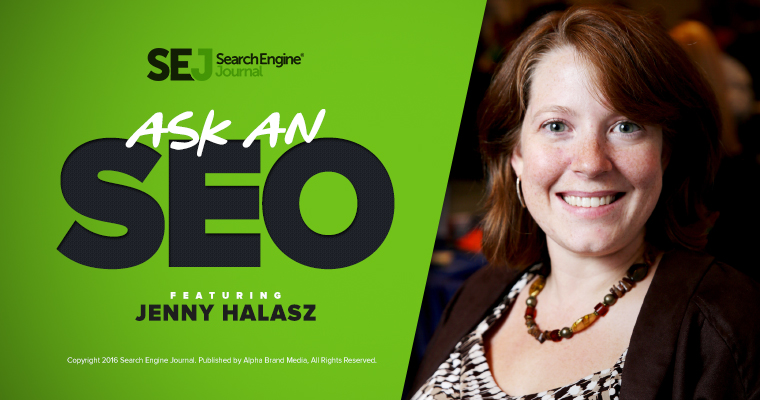Want to ask Jenny an SEO question for her bi-weekly column? Fill out our form or use #AskAnSEO on social media.
Welcome back to Ask an SEO! We’re back to rapid fire questions this week, so let’s see how many I can fit into 2000 words or so…
We are a company in a highly niche industry with highly niche products. Keywords searched however would be hard to put into one single product page. I fear the “keyword stuffing” practice. As an example: we have a product that has multiple keywords to describe that specific product. Example: Main product with alternate keyword 1, alternate keyword 2, alternate keyword 3. Is it a best practice to create a unique landing page for each keyword, where the content for each page is primarily the same with the difference being the URL, the Page Title, Page Description and H1/H2 tags, and alt descriptions of images, all containing the alternate keyword? – Jason D., Mandeville, Louisiana
While it used to be commonplace to recommend this practice, Google has recently indicated that their algorithm has become advanced enough to understand the semantic relevance between similar words. In theory, this is great and means that for keywords like auto, automobile, car, and vehicle, it isn’t necessary to have each of these on their own page. However in practice, Google is still catching up to these semantics in other verticals, especially non-consumer facing verticals or verticals where there isn’t a lot of competition and therefore relevant content.
This long explanation is my way of saying, no, this isn’t a best practice anymore, but if you’re in a very niche market without a lot of competition, you may still want to try and break keywords apart into pages. You don’t need a separate page for each permutation of a keyword, but if you have a number of keywords that have the same meaning, you may want to do 1-2 related keywords per page.
That being said, you always want to focus on doing what is right for users. So if most of your users already know that all these keywords are closely related, it’s probably not necessary to do more than define them each in context. If users would be confused, it may be worthwhile to create a “glossary” of sorts that explains the similarities and differences.
One problem that I am facing in SEO is that rankings of most of my projects is static for almost a year with not much substantial change. Can you please share most important ranking factors which I should keep my focus on and optimize so that I can gain ranking improvement. – Azhar K., Madhya Pradesh, India
It really depends on whether your rankings are static at a high level (3 or 4 but you just can’t get to #1) or static at a low level (50 or 60 and you can’t seem to move off page 5 or 6). Let’s take the first one first, because the answer to the question is easy. Be grateful for what you’ve achieved, and work hard to stay relevant and valuable so that you don’t lose your position. Accept that you may never outrank Amazon or eBay or Wikipedia or whoever is in the top spot.
I suspect, however, that you are probably in the second group. And here the answer varies too. If you are stuck at 50+ and can’t move from there, you probably have some kind of penalty in play. There are lots of other penalties (or “filters”) other than Panda and Penguin – they just don’t have fancy names. There’s a good chance you’ve got a deeper problem, so hire a skilled SEO to do a thorough audit and look for the cause.
If you’re just ranking so-so (above 50, but below 10 – or thereabouts), then you’re probably facing what everyone else faces, which is how to make your voice heard in a crowded and over saturated environment. The answer is everything that you read online. Make something great. Have an independent and interesting voice. Build a following and loyal “customers”. Be awesome. It isn’t easy; it’s really hard work. And you have to invest in it and sustain that investment. Anyone who offers you shortcuts is not to be trusted.
Yoast plugin makes our SEO job easy but it can get difficult at time to follow everything to the tee… Can we skip some the long list and focus on keywords in the title, body, H2, meta des, url and image alts?
– Badal N., Meghalaya, India
Plugins like Yoast are awesome for helping people adjust key elements in do-it-yourself programs like WordPress. I personally use Yoast SEO on all my sites and recommend it to my customers that use WordPress. But like everything else in SEO, it’s not a fix-all. All plugins have issues in that they attempt to machinate what is essentially a human-edited process. Sure, you can template your tags using the handy tools in Yoast.
But will you have more success if you write each one independently? Probably. Will you have enough success to justify the time it takes to do each one individually? Probably not, except on key pages. Have I achieved terrific rankings on pages where the “focus keyword” in Yoast has a red rating? Yes, I have. It’s not the be-all, end-all.
So to answer your question, feel free to skip anything in Yoast or any other plugin. Just make sure that you’re following SEO best practices and creating a great user experience. The Yoast plugin is designed to help you make sure all your I’s are dotted and your T’s are crossed, so think carefully before you ignore its suggestions.
Having your website built with AngularJS – do you see a large-scale implication on SEO to the existing website. In short our new version of the website is built on AngularJS and we want to ensure we cover all bases before we relaunch the website. – Dinesh K., Melbourne, Australia
If you haven’t done it yet, stop. Don’t build your website in Angular JS.
There’s no problem with Angular JS on the face of it. You can optimize it for search; people do it every day. Google even recommends it. It’s super-fast, agile technology. However, the number of SEOs I know who actually know how to optimize for it? 1. And it’s not me. There’s a striking lack of people who know about this technology; both how to build it properly and how to optimize it for search. It’s not plug n’ play just because Google recommends it. Everything with it is harder; from how to tag it for Analytics to how to layer the content. It’s the future of the web, make no mistake about that. I’m trying desperately to learn as much as I can about it. But I know literally thousands of SEOs who admit they know nothing about it.
So the reason I say “Stop, don’t do it” is because if you’re asking the question, you may have a limited number of resources to implement and optimize it. Unless you have an Angular developer ON STAFF who will NEVER LEAVE and an SEO who knows what they are doing with Angular JS, just don’t do it. Yet.
If you feel confident that you know what you are doing and you have the support you need, the rules for building a site with Angular are the same as any other site. Make sure your redirects are in place. Map everything from old to new. Make sure the main content and navigation is accessible via links and not hidden inside JavaScript calls.
How important is Domain Authority and why? – Ket P., Washington DC
It depends on what you mean by “domain authority”. If you mean PageRank (measured by the quality and quantity of links), it’s hugely important for Google – it’s part of the core of their algorithm. If you mean domain authority by the age of the domain, that’s a more difficult question. Some people refer to domain authority as a core aspect of ranking ability, but the truth is that how old your domain is doesn’t matter nearly as much as its history. If an older domain has a history of doing spammy things, then age isn’t going to override that. If a newer domain is home to a company that is doing awesome things, then age isn’t going to matter. If an older domain has a better reputation and lots of quality links achieved over a period of many years, this helps Google determine that the domain/company is highly trustworthy, which is a factor, but again not the most important factor.
Getting hung up on things like domain authority is pretty unproductive, really. It’s not something you can change, or buy your way into. It’s much more important to focus your energy on generating a quality business with loyal and engaged customers.
What is the exact impact of internal links coming to a page? Does it have to do with ease of crawlability alone, or are there other factors as well? Does a greater number of internal links to a page necessarily imply greater SEO value? Does providing internal links from low authority pages to high authority pages reduce the authority of high authority pages? – Srinath R., Maharashtra, India
There are a lot of questions here, so first: It helps connect pages and concepts. There are other factors, although it helps crawlability. Sometimes, not always. No.
The exact impact of internal links is impossible to measure for anyone other than a Google engineer with keys to the algorithm. Internal links help connect pages for crawability, and they also help connect concepts, which is why lots of internal links at the bottom of every page (a “fat footer”) is pretty useless for SEO, unless those concepts are connected. A greater number of internal links doesn’t really help imply greater SEO value. If you have a million pages, and you choose to connect each of those pages to each other, you’re not telling Google anything useful about the importance of those pages and your internal linking efforts are likely to be ignored. If on the other hand, you have a few very important pages that are consistently linked to in the context of the site, you’re sending Google a clear signal that this page is important.
Providing links from high authority to low authority pages is not damaging in the least. Some people call this “nofollow sculpting”. Some SEOs with too much time on their hands decided to try and control the “flow of PageRank” by adding the nofollow command to pages with low quality like privacy policy pages or shipping information pages. Google explained in detail why this doesn’t work back in 2009, and confirmed it again recently.
In essence, PageRank flows equally to all pages. If you cut one off with nofollow, you just cut off the potential PageRank you have available.
Why Page Rank is dead? Any other way to judge website is authoritative except domain authority?
– Manish Singh R.
PageRank isn’t dead; it’s still alive and well and a core facet of Google’s algorithm. Toolbar PageRank is dead – and really was never alive to begin with – it was updated in the Google Toolbar periodically, but always was marked “for entertainment purposes only”. The best way to judge a website’s authority is to download records of their backlinks.
Use tools like Majestic, AHrefs, and Moz to get as complete a picture as possible. If you see a lot of questionable links, it may be a domain purchase you want to pass on, or at least one where you want to hire a reputable penalty expert to review it first. Honestly, if you’re thinking about spending money on a domain, you should probably hire someone to review it anyway.
Keyword density in a product page is still important. And what is the right density in % – Marius M.
Keyword density is an outdated concept. It’s not important anymore. And there is no ideal percentage. Use keywords as it makes sense in the content (if you’re unsure, try reading it out loud) and don’t worry about density. Also keep in mind that Google’s more interested in topical relevance than keyword relevance these days, and as you can see from the first answer in this series, it’s not a perfect implementation, but the days of exact matching keywords are long gone.
Whew, that was a lot of questions! Next time we’ll revisit the long form – with this question:
I wanted to know a checklist sort of document for SEO on-page, what factors to be considered as our new website is under development, so what are the key elements I need to look at this point & ask developer to do before they handover the website. Would love if you can help in On-Page as well. Thanks! -F., Dubai
While I don’t offer free consulting, we’ll break this question down and talk about some of the most important things to think about during redesign.
Thanks as always for reading, and keep the questions coming! We’d also love to hear your thoughts in the comments.
Image Credits
Featured Image: Image by Paulo Bobita
In-post Photo: MPF_Photography/DepositPhotos.com






